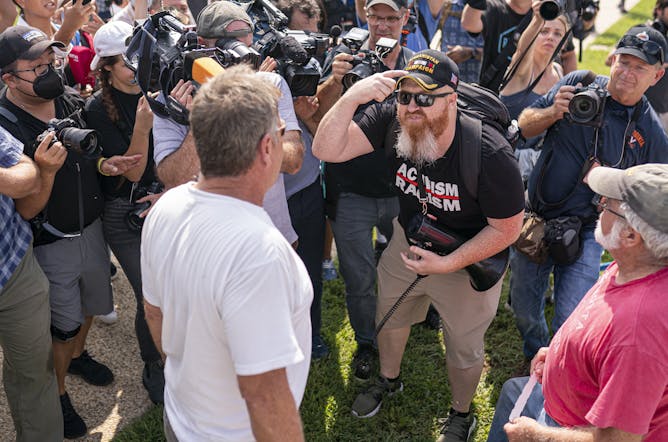|
Political polarization isn’t new – and it’s not necessarily destructive. As the U.S. approaches the first anniversary of the Jan. 6 insurrection at the Capitol in Washington, D.C., political philosopher Robert Talisse reminds Americans that “deep-seated disagreement can be healthy for democracy” because the “clash of opinions can help us find the truth.”
But the kind of “runaway” polarization the U.S. is experiencing today separates people into tribes and can be extremely dangerous to democratic societies, writes Talisse. It transforms people into extremists who “focus on hostility toward those who disagree” – even when they’re allies, the Vanderbilt scholar explains.
What to do? “Polarization is a problem that cannot be solved, but only managed,” adds Talisse, in a slightly hopeful conclusion to his unsettling story. We’ve got more articles coming this week related to the Jan. 6 anniversary, and I promise, this one’s the most optimistic.
Also today:
|

Robert B. Talisse, Vanderbilt University
Deep-seated disagreement is healthy for a democracy. But when people lose the ability to navigate those differences, they risk seeking anti-democratic unity of thought.
|
Health + Medicine
|
-
Richard Huskey, University of California, Davis
Research shows that people with more flow in their lives had a higher sense of well-being during the COVID-19 pandemic. Scientists are beginning to explore what happens in the brain during flow.
-
Brittany Taylor, University of Florida
A biomedical engineer explains how human-made materials inserted in the body hold hope to repair painful injuries more efficiently than bone grafts.
|
|
Science + Technology
|
-
Michael J. Renner, Drake University
A fundamental change in how North American zoos and aquariums are accredited supports their animal conservation and species survival work.
|
|
Environment + Energy
|
-
Gordon D. Hoople, University of San Diego
Solving mathematical equations is only part of the job. Students should be spending more time thinking about the human dimensions of the problems they are trying to solve.
-
Lily Baum Pollans, Hunter College
When governments want people to do less of something, one way to make that happen is to charge them for doing it. That’s the idea behind pay-as-you-throw waste policies.
|
|
Education
|
-
Julie Pernaudet, University of Chicago; Dana Suskind, University of Chicago; John List, University of Chicago
Demonstrating for parents how to talk with their babies and toddlers can improve kids’ vocabulary and math skills, new research finds.
|
|
Economy + Business
|
-
Lucy Bernholz, Stanford University
Informed data donations are different from the usual online data experience. They’re easier to manage because of technological advances.
|
|